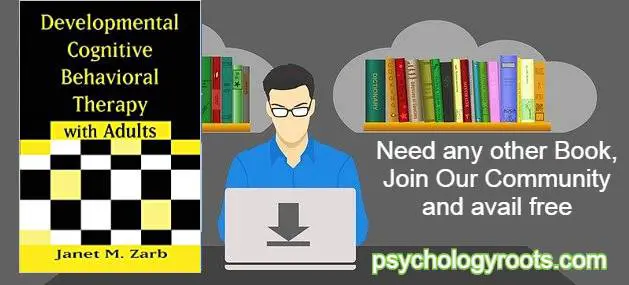Table of Contents
Developmental Cognitive Behavioral Therapy with Adults by Janet M. Zarb
Here in this post, we are sharing the book “The Developmental Cognitive Behavioral Therapy with Adults by Janet M. Zarb”. You can read buying or getting it free both information. We have thousands of books in our collection (See Books). You can demand us any book related to psychology through our community, and we will provide you with a short time. Keep visiting Psychology Roots.
About Developmental Cognitive Behavioral Therapy with Adults by Janet M. Zarb
The aim of this book is to introduce a new psychotherapy approach that combines conventional cognitive therapy with a lifespan developmental psychopathology perspective. The major focus will be on the treatment of adult role difficulties contributing to mental health problems. This approach examines the relationship between depression, anxiety, personality disorders, and other psychological problems and the client’s difficulties in performing expected adult roles and tasks.
It adopts a developmental psychopathology framework that considers behavioral and emotional problems in relation to normative sequences and achievements for particular ages and stages across the life cycle. This new approach will be referred to as Developmental Cognitive Behavorial Therapy, or Developmental CBT.
The initial phase of Developmental CBT adopts the most studied and commonly used CBT model developed by Aaron Beck and his colleagues and expanded by other therapists over the past forty years (e.g., Beck, 1976; Beck & Emery, 1985; Beck & Freeman, 1990; Beck et al., 1979; Beck, J., 1995; Meichenbaum, 1994; Padesky, 1994; Young, Beck, & Weinberger, 1993).
This model is also frequently referred to as cognitive therapy (CT). The primary difference between the new Developmental CBT approach espoused in this book and traditional CBT approaches is the addition of a developmental phase of assessment and treatment that focuses on the client’s inadequate resolution of normative psychosocial developmental tasks and transitions of earlier life stages.
This approach evolved from a common observation by the author and other clinicians that a substantial proportion of people seeking therapy are experiencing problems with adult life tasks and roles, such as leaving the parental home, coping with social or family relationships, or maintaining effective occupational status (Ruble & Seedman, 1996). Many psychotherapy clients are stuck at life transitions and have failed to resolve critical life-stage tasks in the past in occupational, interpersonal, partner, or family functioning areas.
In an attempt to address the client presenting problems and comorbid Axis I and II disorders, therapists may lose sight of the larger picture, namely the client’s failure to resolve normative life tasks that may be maintaining the psychological disorders. For example, clients presenting with depression secondary to unemployment may have failed to develop sufficient self-discipline in the early years for adequate job performance as adults. Similarly, they may have failed to attain educational prerequisites for the desired occupation or failed to develop sufficient independence from the family of origin to establish a separate residence and viable career path.

Developmental Cognitive Behavioral Therapy with Adults by Janet M. Zarb
Download
Link 1: Amazon
Link 2: PDF Drive
Link 3: Google Drive
Information:
The purpose of our website is only to help students to assist them in finding the best suitable instrument for their research especially in Pakistan where students waste a lot of time in search of the instruments. It is totally free of cost and only for creating awareness and assisting students and researchers for good researches. Moreover, it is necessary for you to take the permission of scales from their representative authors before use because copyrights are reserved by the respected authors.
Help Us Improve This Article
Did you find an inaccuracy? We work hard to provide accurate and scientifically reliable information. If you have found an error of any kind, please let us know.
Add comment. we appropriate your effort.
If you have any scale or any material related to psychology kindly share it with us at psychologyroots@gmail.com. We help others on behalf of you.
Follow